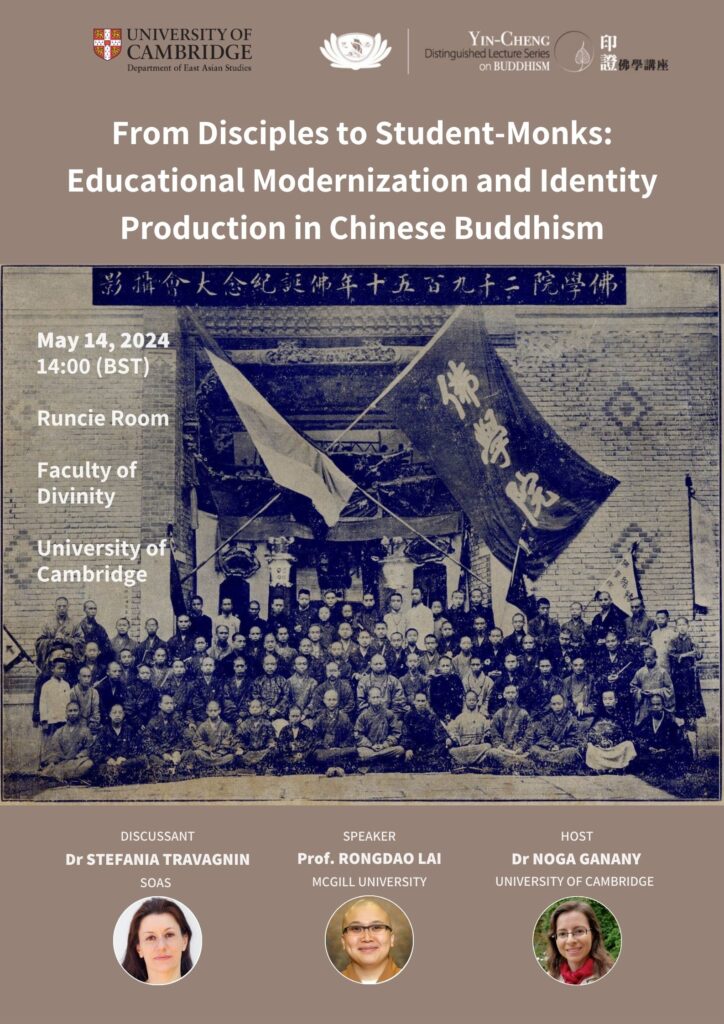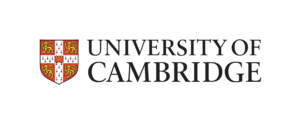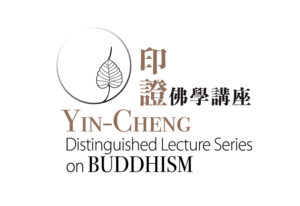Time: May 14, 6:00 am (Vancouver) | 9:00 am (New York) | 2:00 pm (London) | 9:00 pm (Beijing/Taipei)
Runcie Room, Faculty of Divinity (Sidgwick Site, Cambridge, CB3 9DP)
The lecture will be in person and live-streamed via YouTube with simultaneous English and Mandarin channels.
Abstract:
Monastic education was one of the most important aspects of the modernization project in Chinese Buddhism. It went through a fervent period of growth in the 1920s and 30s. This talk addresses the convergence of identity and institution, focusing on the emergence of modern Buddhist academies (foxueyuan 佛學院) and the students they produced, in this specific historical context. I identify three paradigm shifts that concretely influenced the practice of modern Chinese Buddhism. The vertical teacher-student dynamic at modern foxueyuan led to a new understanding of the traditional master-disciple relationship in Buddhism. Teachers, rather than having absolute authority and responsibility, provided the ideological inspiration for their students’ undertaking. This ideological underpinning was the basis for the construction of a new, horizontal relationship among the students, which eventually manifested in the production of a collective student-monk identity. Lastly, Buddhist reformers and educators justified the founding of the new foxueyuan as a renewal rather than departure from the traditional public monastery (conglin 叢林) training. This re-interpretation of orthodoxy, grounded in the performance of the student-monk identity, reinforced the role of the Buddhist academies and their students in the institutional transformation of Chinese Buddhism in the twentieth century.
About the speaker: Rongdao Lai (McGill University)

Rongdao Lai is assistant professor of Religious Studies and East Asian Studies at McGill University, Canada. She was formerly assistant professor at the University of Southern California, postdoctoral fellow at the Asia Research Institute (National University of Singapore), and research fellow in the Robert H. N. Ho Family Foundation Program in Buddhist Studies. Her research focuses primarily on the changing landscape and identity production in modern Chinese Buddhism. Her monograph Citizen Bodhisattvas: Education, Student-Monks, and Citizenship in Modern Chinese Buddhism is forthcoming by Brill. Her other on-going projects include historical production, lineage networks, transnational movements, and monastic economy in twentieth-century Chinese Buddhism.
About the discussant: Stefania Travagnin (SOAS)

Stefania Travagnin is Reader in Chinese Buddhism at SOAS, University of London. Travagnin is currently co-director of the multiyear project “Mapping Religious Diversity in Modern Sichuan”; within this project, she is exploring Han Buddhist local micro-histories, female communities, patterns of Sangha education, and the spatial ecology of religious sites, focusing especially on the time from the late Qing to the end of the Republican era. Travagnin has also done field research among Buddhist communities in Taiwan for more than twenty years, studying Buddhist women, the phenomenon of Humanistic Buddhism, the figure of the monk Yinshun, and the intersection between religion and media. She has been recently awarded a British Academy Mid-Career Fellowship for completing a research on Tzu Chi’s multifaith membership and global humanitarianism. She has edited or co-edited several volumes, including Religion and Media in China: Insights and Case Studies from the Mainland, Taiwan, and Hong Kong (Routledge, 2016), and the three-volume publication Concepts and Methods for the Study of Chinese Religions (De Gruyter, 2019-2020). She is editor in chief of the journal Review of Religion and Chinese Society.
About the host: Noga Ganany (University of Cambridge)

Noga Ganany is an Associate Professor in the Study of Late Imperial China at the Faculty of Asian and Middle Eastern Studies at the University of Cambridge and a Fellow of Sidney Sussex College, Cambridge. Her main research interests are Chinese cultural history, religious practice in China, premodern Chinese literature and book culture, travel and pilgrimage, and popular culture. She is currently writing a book titled Origin Narratives: Hagiographic Literature and Religious Practice in Late Ming China, which examines the role of commercial publishing in propagating cultic reverence of saints, gods, and immortals among lay readers. Her most recent publications include “Journeys Through the Netherworld in Late Ming Hagiographic Narratives” (Late Imperial China, 2021) and “Writing and Worship in Deng Zhimo’s Saints Trilogy” (Religions 2022). Before assuming her current position at Cambridge, Dr Ganany taught briefly at Boston University (2018-2019) after receiving her PhD from Columbia University in New York (2018). Dr Ganany is a board member of the Society for the Study of Chinese Religions (SSCR) and a board member of the Society for Ming Studies.
About the Yin-Cheng Distinguished Lecture Series: Launched in September, 2021, the Yin-Cheng Distinguished Lecture Series (印證佛學傑出學術系列講座) is a collaborative, multi-university partnership between Peking University, University of Oxford, University of Cambridge, Inalco (Institut national des langues et civilisations orientales), Princeton University, Harvard University, and the University of British Columbia. The Lecture Series is established in honour of Venerable Cheng-yen 證嚴, founder of Tzu Chi, and her mentor Yinshun 印順 (1906–2005), with the goal of promoting topics in Buddhist Studies.
Click to download the poster











